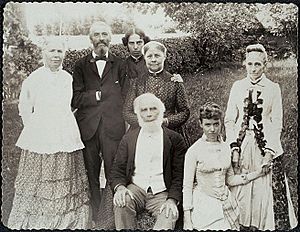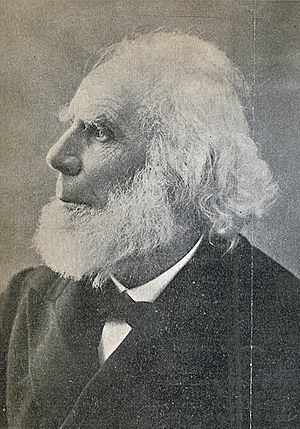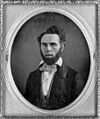Henry Browne Blackwell facts for kids
Quick facts for kids
Henry Browne Blackwell
|
|
|---|---|
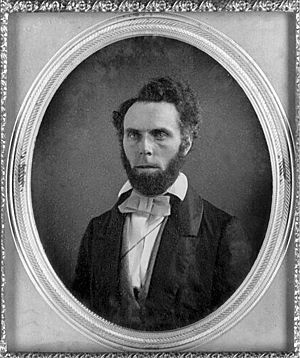 |
|
| Born | May 4, 1825 Bristol, Gloucestershire, England
|
| Died | September 7, 1909 (aged 84) Dorchester, Massachusetts, United States
|
| Occupation | Activist |
| Spouse(s) | Lucy Stone |
| Children | Alice Stone Blackwell |
Henry Browne Blackwell (born May 4, 1825 – died September 7, 1909) was an American activist. He worked for important social and economic changes. He helped start the Republican Party. He also co-founded the American Woman Suffrage Association. This group worked to get women the right to vote. From 1870, he published the Woman's Journal in Boston, Massachusetts, with his wife, Lucy Stone.
Contents
Early Life and Family Challenges
Henry Blackwell was born in Bristol, England, on May 4, 1825. He was the seventh of nine children. His father, Samuel Blackwell, made sugar. But he was against slavery, so he tried to make sugar from beets instead of slave-grown cane.
In 1832, Henry's family moved to the United States. They first lived in New York, then in Jersey City. Henry's father was interested in the movement to end slavery. Important leaders like William Lloyd Garrison visited their home. Henry's older sister, Anna, also supported women's rights early on.
In 1838, the family moved to Cincinnati. Soon after, Henry's father died. This left the family with no money. Henry's mother and older sisters opened a school. Thirteen-year-old Henry and his brother Sam took jobs as clerks.
Henry later tried different businesses. He worked in a flour mill and then tried sugar refining. He also became a partner in a hardware business. He traveled a lot, selling hardware to stores in Ohio, Indiana, and Illinois.
All the Blackwell children believed in improving themselves and helping others. Henry loved reading and writing poetry. He was a founding member of the Literary Club of Cincinnati. Here, he discussed books and important issues with friends. Some of these friends became famous, like Rutherford B. Hayes, who later became president.
Meet the Blackwell Siblings
Henry Blackwell came from a very interesting family. Many of his brothers and sisters became famous in their own right.
Anna Blackwell: Writer and Translator
Henry's oldest sister, Anna Blackwell (1816–1900), was a poet, translator, and journalist. She lived in France and translated books by French writers. She also wrote for newspapers around the world.
Elizabeth Blackwell: First Woman Doctor
Elizabeth Blackwell (1821–1910) was Henry's best-known sister. She was the first woman in the United States to become a doctor. She opened the New York Dispensary for Poor Women and Children in 1853. Later, with her sister Emily, she started the New York Infirmary for Indigent Women and Children.
Samuel Charles Blackwell: Minister's Husband
Samuel Charles Blackwell (1823–1901) was a businessman. He is known as the husband of Antoinette (Brown) Blackwell. She was the first woman minister in the U.S. and a strong supporter of women's rights.
Emily Blackwell: Another Woman Doctor
Emily Blackwell (1826–1910) was the third woman to earn a medical degree in the U.S. She helped her sister Elizabeth with the New York Infirmary. She also helped train nurses for the Civil War.
Sarah Ellen Blackwell: Artist and Author
Sarah Ellen Blackwell (1828–1901) was an artist and writer. She wrote an important book about Anna Ella Carroll.
Other Siblings
Henry also had two younger brothers:
- (John) Howard Blackwell (1831–1866) worked in England and India.
- George Washington Blackwell (1832–1912) was born in the U.S. He became a land agent and later took over Henry's real estate business.
Marriage to Lucy Stone
Henry Blackwell met Lucy Stone in May 1853. She was a powerful speaker who fought against slavery. Henry was very impressed by her. He followed her to Massachusetts and asked her to marry him.
Lucy was worried that marriage would make her lose her independence. She thought it would stop her from doing her important work. But Henry promised her that their marriage would be different. He said it would be based on equality. He believed they could achieve more together.
A Partnership for Equality
Henry worked hard to convince Lucy. He even helped her organize a speaking tour in the Midwest. This tour was a big success. Lucy saw how much Henry supported her work.
After many letters and meetings, Lucy agreed to marry him. They made a special agreement to protect Lucy's independence. They decided to share expenses and keep their own property. They also agreed that neither would control the other's life or work. Lucy insisted on choosing when and how often she would have children.
Protesting Marriage Laws
Henry and Lucy got married on May 1, 1855. During the ceremony, they read a public protest. They said they did not agree with the laws that gave husbands too much power over their wives.
They protested laws that gave husbands:
- Control over their wife's body.
- Full control of their children.
- Ownership of their wife's property and earnings.
- More rights to a deceased wife's property than a widow had to her husband's.
- The power to stop a wife from making a will or suing in her own name.
They believed marriage should be an equal partnership. Their protest became famous and inspired other couples.
In 1857, Henry and Lucy had a daughter named Alice. Two years later, they sadly lost a baby boy.
Business Ventures and Activism
In 1856, Henry and his brother sold their hardware business. Henry then worked for a company that published farming books. He created a new idea: selling collections of books for school libraries. This was very successful, and he earned a good salary.
Henry and his family were also interested in buying and selling land. They bought land in Wisconsin, Iowa, and Minnesota. Henry became very good at this. By the time he married Lucy, he owned thousands of acres of land.
Lucy also invested in land, keeping her money separate from Henry's. They bought and sold properties, but often had little cash. Henry sometimes took other jobs to pay taxes and bills.
By 1864, Henry had enough money from his land sales to focus on his true passion: social causes. He never took a salary for his work on the Woman's Journal. This allowed him to dedicate his time to helping others.
He even tried to develop a new way to make sugar from beets. He hoped this would help end slavery in the West Indies, where cane sugar was often produced by enslaved people. His beet sugar company didn't last, but it showed his commitment to fighting slavery.
Fighting for Women's Right to Vote
Henry Blackwell was a strong supporter of women's right to vote, also known as woman suffrage. He often helped Lucy Stone with her work.
In 1855, he lectured with her and helped organize a women's rights convention. In 1857, when Lucy refused to pay taxes because women couldn't vote, Henry supported her. They lectured together on "Taxation without Representation." Henry argued that giving women the vote would help all political parties.
Working for Universal Suffrage
After the Civil War, in 1866, the National Woman's Rights Convention formed the American Equal Rights Association (AERA). This group worked for "universal suffrage," meaning the right to vote for both Black people and women. Henry served as the secretary of this group.
Henry and Lucy traveled to Washington, D.C. They tried to stop the word "male" from being added to the Fourteenth Amendment. This amendment would protect Black men's right to vote but not women's. They failed, but Henry wrote an open letter to Southern lawmakers. He argued that giving white Southern women the vote would balance the votes of Black men and women.
In 1867, Henry and Lucy went to Kansas. Voters there were deciding on two issues: whether to remove "male" and "white" from voter qualifications. They campaigned for two months, hoping for success.
Forming New Suffrage Groups
When they returned, Henry and Lucy focused on creating a separate movement for woman suffrage. They helped form the New Jersey Woman Suffrage Association. In 1868, they helped start the New England Woman Suffrage Association. They also worked to create "Liberty Leagues" in Massachusetts. These were groups of men who promised to vote only for politicians who supported women's right to vote.
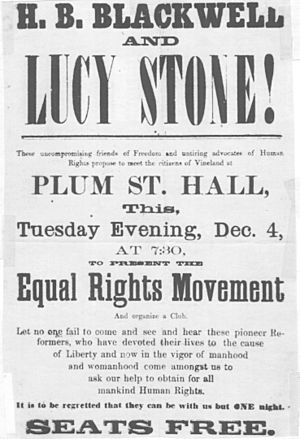
The Fifteenth Amendment was being drafted to give Black men the right to vote. Henry and Lucy again tried to include women, but failed. Meanwhile, Elizabeth Cady Stanton and Susan B. Anthony opposed any amendment that didn't include women. This caused a split in the AERA.
In 1869, Stanton and Anthony formed the National Woman Suffrage Association. This group opposed the Fifteenth Amendment. Many other suffragists felt left out. So, the New England Woman Suffrage Association called for a new, truly "national" group. The American Woman Suffrage Association (AWSA) was formed in October 1869. Henry Blackwell wrote its rules and became its recording secretary.
The Woman's Journal
The New England Woman Suffrage Association also started the Woman's Journal. This weekly newspaper became the main publication for the AWSA. Henry Blackwell gave the first $1,000 to start the paper. He was also its biggest shareholder.
In 1872, Henry and Lucy became editors of the Woman's Journal. Their daughter, Alice Stone Blackwell, joined them in 1881. After Lucy died in 1893, Henry continued editing until his own death in 1909. He never took a salary for his work. The Woman's Journal was the longest-running suffrage newspaper in the country.
A Key Strategist for Women's Rights
Henry Blackwell was an important leader in the American Woman Suffrage Association (AWSA). He was even its president in 1880. He also held positions in other suffrage groups. He used his political connections to get the Massachusetts Republican Party to support woman suffrage in 1872.
Henry was a very good speaker. He gave speeches at meetings, conventions, and legislative hearings. He and Lucy worked together on many state campaigns, like in Colorado in 1877 and Nebraska in 1882. Even when Lucy's health failed, Henry continued campaigning alone.
One expert said that Lucy Stone and Henry Blackwell were as important a team as Elizabeth Cady Stanton and Susan B. Anthony. Lucy thanked Henry for his "unselfish work" for women. She said few men would have given up their business and friends to do what he did.
Henry came up with a smart plan for the AWSA. He suggested seeking "partial suffrage" through state laws. This meant getting women the right to vote in city elections (municipal suffrage) or for president (presidential suffrage). He believed these smaller steps would be easier to win than full constitutional amendments. He thought that every small victory would help lead to full suffrage.
The AWSA worked hard for municipal and presidential suffrage. Before the 19th Amendment gave women the right to vote nationwide in 1920, eleven states had already given women the right to vote for president.
Henry also had a plan for states writing new constitutions. In 1889, when North Dakota, Montana, and Washington were becoming states, he pushed for woman suffrage to be included. If full suffrage couldn't be won, he suggested a clause that would allow future state legislatures to grant women the vote more easily. He traveled to these conventions and spoke to leaders. While his efforts didn't fully succeed, they came very close in some states.
Death and Lasting Impact
Henry Blackwell died in 1909 from an inflammation of his bowels.
His daughter, Alice Stone Blackwell, continued his and Lucy's work. She helped edit the Woman's Journal. She also became a leader for women's rights and the Temperance movement, which worked to limit alcohol.
Writings
- "The Lesson of Colorado" (1877)
- "Objections to Woman Suffrage Answered"
Images for kids
 | Calvin Brent |
 | Walter T. Bailey |
 | Martha Cassell Thompson |
 | Alberta Jeannette Cassell |


